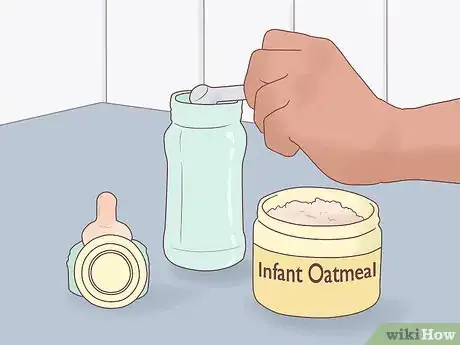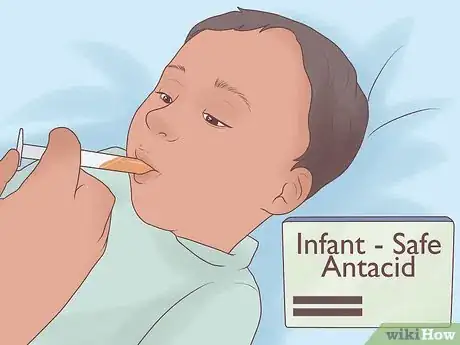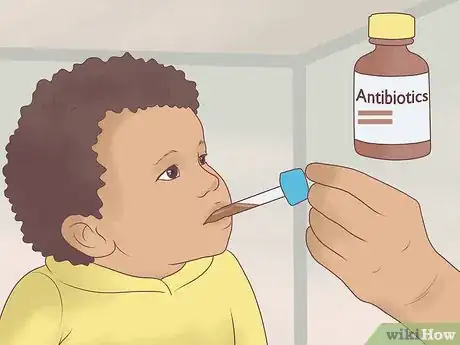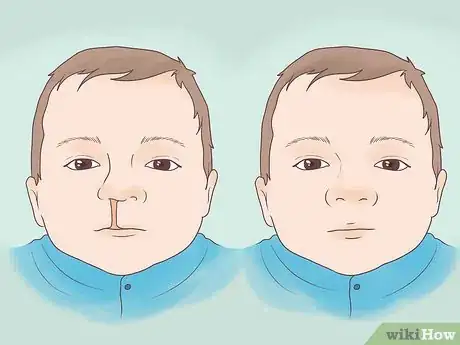This article was medically reviewed by Erik Kramer, DO, MPH. Dr. Erik Kramer is a Board-Certified Primary Care Physician at the University of Colorado. With over 15 years of experience, his clinical interests include obesity and weight management, diabetes care, and preventive care, as well as embracing a holistic approach to primary care. He received his Doctorate in Osteopathic Medicine (D.O.) from the Touro University Nevada College of Osteopathic Medicine and completed his residency at Central Maine Medical Center. Dr. Kramer is a Diplomate of the American Board of Obesity Medicine.
This article has been viewed 19,461 times.
Aspiration is a common yet often scary issue that occurs when foods or liquids enter your baby’s airway and lungs. While aspiration can happen to any infant, it’s often caused by an underlying issue such as a muscular swallowing dysfunction, acid reflux disease, or a structural abnormality. To help prevent your baby from aspirating, you can first try altering your baby’s feeding methods to help them swallow and digest foods and liquids properly. If your baby is still at high risk for aspiration, medication, a feeding tube, or surgery may be needed to address the underlying cause.
Steps
Feeding Your Baby Correctly
-
1Place your infant in an upright position during feedings. To ensure that your baby’s foods and liquids are swallowed properly, elevate your baby’s head by at least 30 degrees during feedings.[1] Gravity will make it easier for your baby to swallow and help the food or liquids move safely into your baby’s stomach.
- If your infant is a little older and able to sit up, encourage them to do so every time they eat, particularly once they start consuming more solid foods.
-
2Keep your baby upright for 90 minutes after feeding. To help prevent aspiration, avoid feeding your infant for about 90 minutes before putting them down for the night or a nap. If there is any food or liquid in your baby’s mouth or throat, placing them in a lying position could heighten the risk of aspiration.[2]
- By waiting 90 minutes, you can make sure that your baby’s food and liquids have been properly swallowed.
Advertisement -
3Give your infant smaller, more frequent meals. This will give your baby more time to swallow properly and have less food to digest in between feedings, reducing the risk of aspiration. When changing your baby’s meal plan, however, make sure that you consult your pediatrician to ensure that your baby is the nutrition they need.[3]
-
4Feed your baby slowly so they’ll have time to swallow and breathe. To help prevent your baby from aspirating, try feeding them slowly so that they have plenty of time to completely swallow food or liquids before ingesting any more. Feeding your baby in a slow, controlled pace can help them learn to suck in, swallow, and then breathe properly to avoid aspirating.[4]
- If your baby has a condition that puts them at higher risk for aspiration, work with your pediatrician or a feeding therapist to determine the correct pacing for your baby’s feedings.
- You can also buy slow-flow nipples for your bottles so your baby doesn’t drink as much liquid while they’re feeding.
-
5Add a thickener if your baby has trouble drinking liquids. To prevent your baby from aspirating after drinking formula or breastmilk, you can add a thickening agent to your infant’s liquids. Always consult your pediatrician first, however, as the type and amount of thickener will vary depending on the cause of your infant’s increased risk for aspiration.[5]
Seeking Medical Intervention
-
1Look for the signs that your baby is aspirating. While aspiration doesn’t always cause noticeable symptoms in infants, there are some signs that you can look for that may indicate your baby is aspirating. Aspiration can occur whenever the airway’s protective mechanisms are stressed, such as while laughing, eating, sleeping, or talking. If your baby exhibits any of these signs, seek medical attention immediately to ensure that your baby’s condition doesn’t get worse.[8]
- In extreme cases, aspiration can cause your baby to choke. If this happens, you’ll need to do first aid to clear your baby’s airway.
- The most common signs of aspiration in infants are weak sucking, coughing or gagging while feeding, slowed or quickened breathing while feeling, wet sounds after feeding, fever, and wheezing.
- In addition, red face, watery eyes, and facial grimaces while feeding can be signs that your baby is aspirating.
- Aspiration can cause repeated lung infections and pneumonia. If your baby is dealing with either of these conditions, ask your doctor is aspiration may be the cause.
-
2Take your baby to the doctor to determine if there’s an underlying cause. While aspiration can occur with any infant, it’s often caused by an underlying issue. If your baby exhibits the signs of aspiration, ask your pediatrician to examine them to determine if it’s because of an underlying cause. This will help you and your pediatrician determine the best course of action.[9]
- Common causes of aspiration in infants include structural abnormalities (such as a cleft palate), acid reflux disease, delayed muscular growth from premature birth or Down syndrome, brain damage, infection, or neuromuscular disease (such as spinal muscular atrophy).
- The initial evaluation usually involves the pediatrician or a speech-language pathologist observing a feeding. More diagnostic evaluations may include a videofluoroscopic swallow study, endoscopic evaluation of swallowing, X-rays, and flexible laryngoscopy.
-
3Give your baby an infant-safe antacid if they have GERD. If your baby has gastroesophageal reflux disease (GERD), your pediatrician may prescribe an infant-safe antacid to help prevent aspiration caused by GERD.[10] Combined with alterations to your baby’s feeding method, antacids can reduce your baby’s risk of aspiration.
- Be careful not to confuse overfeeding and spitting up with GERD. Try reducing the amount that you feed your baby to see if that helps.
-
4Use antibiotics if your baby’s aspiration is caused by inflammation. In some cases, aspiration occurs as the result of inflammation due to an infection or chronic disease that makes it difficult for your baby to swallow properly. If your pediatrician determines this is the cause of your baby’s aspiration, they will likely give your baby a prescription for antibiotics.[11]
- Aspiration can also cause inflammation and infections, including aspiration pneumonia. Aspiration pneumonia is also treated with antibiotics.[12]
-
5Ask your pediatrician if your baby needs a nasogastric tube. In rare cases, your pediatrician may determine that your baby needs a feeding tube to reduce the risk of aspiration. This generally only occurs when altering your baby’s positioning and food intake has not worked, or if your baby has a more severe condition that makes it unlikely they will be able to properly swallow foods and liquids on their own.[13]
- A nasogastric tube is a thin tube that is usually inserted through your baby’s nose and goes down into the stomach.
- While feeding tubes can be scary, they help make sure that your baby safely gets the proper nutrition they need.
- Feeding tubes are usually only used temporarily while alternative solutions to your baby’s aspiration are considered.[14]
-
6Schedule surgery if the underlying cause is a structural abnormality. If your baby has a structural abnormality such as a cleft palate, your baby’s doctor may determine that a surgical procedure is necessary to correct the underlying issue and ensure that your baby can safely swallow during feedings. In extreme cases, surgery may also be used to correct chronic reflux issues.[15]
- Some of the structural abnormalities that can cause or increase the risk of aspiration are a cleft palate, esophageal atresia, laryngeal cleft, duodenal obstruction, and tracheoesophageal fistula.
References
- ↑ https://www.cedars-sinai.org/health-library/diseases-and-conditions---pediatrics/a/aspiration-in-babies-and-children.html
- ↑ http://depts.washington.edu/growing/Feed/Aspir.htm
- ↑ http://depts.washington.edu/growing/Feed/Aspir.htm
- ↑ http://depts.washington.edu/growing/Feed/Aspir.htm
- ↑ http://www.childrenshospital.org/conditions-and-treatments/conditions/a/aspiration-in-children
- ↑ https://medlineplus.gov/refluxininfants.html
- ↑ https://medlineplus.gov/refluxininfants.html
- ↑ https://www.cedars-sinai.org/health-library/diseases-and-conditions---pediatrics/a/aspiration-in-babies-and-children.html
- ↑ https://www.cedars-sinai.org/health-library/diseases-and-conditions---pediatrics/a/aspiration-in-babies-and-children.html
- ↑ https://www.cedars-sinai.org/health-library/diseases-and-conditions---pediatrics/a/aspiration-in-babies-and-children.html
- ↑ http://child-foundation.org/what-is-child/child-disorders/aspiration-syndromes/
- ↑ https://www.cedars-sinai.org/health-library/diseases-and-conditions---pediatrics/a/aspiration-in-babies-and-children.html
- ↑ http://www.childrenshospital.org/conditions-and-treatments/conditions/a/aspiration-in-children
- ↑ https://www.cedars-sinai.org/health-library/diseases-and-conditions---pediatrics/a/aspiration-in-babies-and-children.html
- ↑ https://www.cedars-sinai.org/health-library/diseases-and-conditions---pediatrics/a/aspiration-in-babies-and-children.html





































































